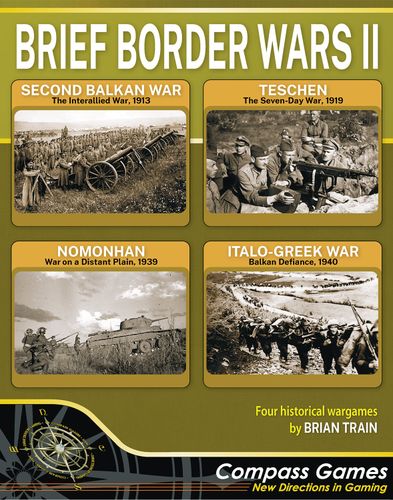Description
Brief Border Wars 2 is the second set of four small operational level games on short border conflicts from Compass Games. The game system uses a card-driven system first introduced in Brief Border Wars that models the chaotic, stop-and-start nature of these impromptu wars. Four sets of exclusive rules reflect the peculiar nature of each conflict. Your sense of improvisation will be challenged as you explore four of the more interesting small wars fought in the early 20th century.
The four conflicts include:
1913: Second Balkan War (also known as “The Interallied War”)
1919: The Seven-Day War (also known as “Teschen”)
1939: The Nomonhan Incident (also known as “The Battle of Khalkin Gol”)
1940: The Italo-Greek War (also known as “The Balkan Defiance”)
Here is more background on each border war portrayed.
1913: Second Balkan War
The division of lands given up by the Ottoman Empire at the end of the First Balkan War was soon the subject of squabbles between the allied nations that had defeated the Empire. Bulgaria decided to grab as much of this territory as it could by a surprise attack on June 30, 1913 against Serbia and Greece. The offensive by their more powerful army soon petered out due to poor logistical depth and bad coordination, then in mid-July Romanian and Ottoman forces crossed Bulgaria’s borders. This made Bulgaria sue for peace but if the Bulgarian player has seized enough territory and made significant diplomatic assurances, they will have a better position in the negotiations.
1919: The Seven-Day War
The Duchy of Teschen (Cieszyn in Polish) was part of the Austro-Hungarian Empire until the end of the war. The two new countries of Czechoslovakia and Poland both laid claim to the territory on historic and ethnic grounds; more urgently, both countries desperately needed the land because of its large coal deposits and valuable mines, as well as the important iron and steel works at Trinec. On January 23, 1919, Czechoslovakia invaded to seize control of as much of the region as they could to stop Poland’s efforts to claim sovereignty over it. After seven days of fighting, the Entente nations forced a ceasefire and the two antagonists signed an agreement establishing a border at the Olza River, dividing the city of Cieszyn.
1939: The Nomonhan Incident
Also called the Battle of Khalkin Gol, this border clash between Japanese and Soviet forces in a remote part of the Mongolian grasslands had an impact on the development of the Second World War in the Pacific all out of proportion to the numbers involved. The game covers the early to mid-July 1939 period, the only time frame in which the Japanese Army could have succeeded in overpowering the local Soviet forces and establishing their claim to the zone between the Soviet claimed boundary and the Halha River. The attack provoked extensive reinforcements for the Soviet 57th Corps and their counteroffensive in August under the command of General Georgi Zhukov discouraged the Japanese Empire from contemplating further attacks on Mongolia or the USSR.
1940: The Italo-Greek War
This game covers the first two months of the Italian invasion of Greece in the fall and winter of 1940. Hardly anything went right for the Italians; chaotic logistics and poor communication nullified their great advantage in men and machines and their offensive was halted and then thrown back into Albania by the determined Greek forces. Could you have done better than Mussolini?
These games are ideal short matches to finish off an evening of gaming, or fill a lunch hour. Either way your sense of improvisation will be challenged, and you’ll explore four of the interesting yet obscure small wars of the last 50 years.
Product information
Complexity: 4 out of 10
Solitaire Suitability: 5 out of 10
Time Scale: variable (1 day to 1 week per turn)
Map Scale: variable (area movement)
Unit Scale: variable (paramilitary “groups” to divisions)
Players: 1-2 (best with 2)
Playing Time: 1-2 hours each
Designer: Brian Train
Components
Four maps at 17” by 22”
One countersheet of 176 9/16” counters
One Player Aid Card
One deck of 54 playing cards
One system rules booklet
Four exclusive rules booklets
Two 6-sided dice
-description from publisher's website


Comments (0)